- Autocrats who rule over ethnically-diverse countries and don’t have personal armies tend not to fare well after a military defeat
- Many regions in the Russian Federation already have a history of independence movements
- Some countries and regions around the world will suffer with the end of Putin’s rule while others will thrive
- The international community should be better prepared for the fall of the Russian Federation than it was for the fall of the Soviet Union
When Soviet troops left Afghanistan in defeat in 1985, few people predicted that the Soviet Union would collapse five years later. Today, many argue that it was the strategic errors in Afghanistan that contributed, in part, to the end of the Soviet Union.
Even now, not many people would believe that a Russian defeat in Ukraine could lead to the dissolution of the Russian Federation, the largest country in the world by landmass (formed by dozens of political entities and ethnic groups). However, there are several reasons why the Russian Federation is more fragile than it seems on the surface.
Thus, a defeat in Ukraine could be the final nail in the coffin of the Russia we know today. This doesn’t mean Russia will cease to exist. It just will no longer be the vast country it is today extending from Europe, the Caucasus, Central Asia, and the Artic, all the way to east Asia. It has the potential to break up into smaller units the same way the USSR broke up at the beginning of the 90s.

Is there really any chance that Russia will lose the war against Ukraine?
As we published just a few weeks after the start of the Russian invasion, we forecasted that Russia had already lost strategically in Ukraine, though not yet militarily. Essentially, all our predictions on Russia’s strategic setbacks came to pass. However, we now predict that Russia will also lose militarily in Ukraine.
As of September 6th, the recent successful Ukrainian counteroffensives in the Kherson region in the South and around Kharkiv in the North have proven that Ukrainian troops with the proper training and military support of the West/NATO can take on the fight against Russian troops. These Ukrainian successes in the battlefield ride on the back of little to no Russian military progress in more than a month. With this in mind, the tide of the war has definitely turned in Ukraine’s favor.
To add to this shift, a Russian victory is simply not an option for the West. Beyond the obvious reason of defending the Global Liberal Order against autocracies, the West (or more specifically the U.S. and the E.U.) know that what happens in Ukraine will determine what happens to Taiwan in the near future. A weak American/European Union response against Russia would show China that Taiwan would have to fight alone, thus inviting Beijing to take the island by force.
However, Taiwan is a matter of national security for both the U.S. and the E.U. since it’s the largest producer of semiconductors in the world, the gold of the 21st century and the 4th economic revolution. Thus, based on the show of support for Ukraine, the same is expected for Taiwan, and China knows this.

Finally, as time goes by, American and European support for Ukraine will only increase while Russia’s economy and military will only get weaker. Therefore, it’s only a matter of time until Russia loses the war.
At this point, we only see two potential scenarios in which Russia would not lose: a full Chinese intervention supporting Moscow which would lead to a NATO response and ultimately WWIII, or Putin declaring total war and a full mobilization of the Russian society. This would likely only accelerate a revolution inside of Russia since the Russian Babushkas are not too keen on seeing their sons and grandsons going to war for unclear reasons.
But how exactly could a Russian military defeat lead to the country’s dissolution?
A defeat in Ukraine does not mean that Russia would be invaded, occupied, or cut into pieces by the western countries or its neighbors. This process of dissolution would mostly come from a military defeat. This would in turn lead to some sort of coup d’état against Putin, leaving the country with a leadership vacuum that could incentivize disaffected ethnic groups and regions to break away.
This potential Russian dissolution may be similar to the Balkanization that occurred in Yugoslavia after the death of Marechal Tito. When strongman-style leaders who rule over diverse ethnic groups are gone, the glue – and the arms – that hold these countries together go with them. This allows the opportunity for independence movements to appear and flourish, ultimately leading to some regions breaking away.
7 Reasons why a defeat in Ukraine could lead to the end of the Russian Federation
- Autocrats tend not to fare well after a military defeat.
When a democracy loses a war, its people can vote their defeated leader out of power, punishing him or her for their military failure. In autocracies, fair elections are not an option. Thus, the only way to get rid of an unpopular autocratic leader is through a coup d’état or a revolution.
Putin is a strongman who has been in power in Russia (directly or indirectly) for more than 22 years. In the case of a defeat, he is unlikely to leave power willingly. The more probable outcome would be a coup orchestrated by the dissatisfied and demoralized military elite who are supported by a handful of the powerful Russian oligarchs who have been losing billions of dollars thanks to the West’s economic sanctions against Putin’s military ventures.
For this particular scenario to come about, there would have to be at least a partial public dissatisfaction with Putin and his “special military operation” in Ukraine. This growing, though still small, dissatisfaction against the war has already begun. With Russia’s eventual defeat, or with Putin declaring total mobilization as a last-ditch effort, this popular dissatisfaction will explode. From there, all the pieces will be in place for Putin’s fall.
Among many historical precedents, we can highlight Mussolini in Italy after the Italian defeat in WWII or General Galtieri in Argentina after the defeat in the Falklands War.
- Putin’s personal National Guard (Rosgvardia) and “Kadyrovites” thugs have been weakened by fighting in Ukraine.
To avoid the scenario above, many autocrats form personal armies separate from the regular armed forces. These serve as a kind of personal security detachment to protect the leader in case of a potential coup, even if the threat comes from the regular armed forces themselves.
In the case of Russia, Putin formed the Rosgvardia, or National Guard, as his personal army under his direct control and outside the regular military echelon. Besides the Rosgvardia, Putin also has personal and military support from Kadyrov, the head of the Chechen Republic, and his “Kadyrovites,” Kadyrov’s nearly-personal armed forces who follow his orders blindly.
The problem for Putin is that, after the regular Russian armed forces took severe casualties in Ukraine, Putin sent both the Rosgvardia and the Kadyrovites to fight in Ukraine. Both units suffered severe losses. Therefore, if there were to be a coup attempt in Moscow, neither of these two units would be able to defend Putin (or Kadyrov) against the still somewhat powerful Russian military.
As a historical precedent, we can look to the failure of the White Army to defend the Tsar against the Bolsheviks during the Russian Civil War. One of the reasons for this failure was that the Tsar had sent his White Army to fight several wars abroad, ultimately weakening it to the point that it was not able to defend him against internal enemies when the time came. Putin’s personal security forces appear to be following the same path.
- The Russian Federation is formed by many different entities with very different customs, cultures, and levels of autonomy.
The Russian Federation is formed by 86 different “federal subjects” consisting of republics, krais, oblasts, and cities of federal importance bordering sixteen sovereign nations.
These subjects have considerable levels of historical and cultural differences among them as well as varying levels of autonomy in regards to Moscow. Throughout this vast territory and federal subjects, there are also many ethnic groups, 193 to be precise. Some are clustered in the same oblasts, others are spread throughout the whole Russian Federation. Though ethnic Russians are the majority, 19% of the population is formed by ethnic minorities.
In a developed country during peaceful times and with friendly borders, uniting such a heterogeneous populace is already a formidable endeavor. In a country like Russia, which has serious social-economic issues, troops engaging in active and frozen conflicts around its borders, and powerful neighbors such as China, this is even more complicated.
This is why, if Putin is toppled, it is likely that different insurgencies will start to pop up, or that the existing ones may increase their search for greater autonomy or even full independence.
- Insurgency in Chechnya may resurge as Kadyrov troops are weakened in Ukraine.
The most famous rebellion in recent Russian history is the independence movement in Chechnya. Chechnya fought two brutal wars against Russia (1994-1996 and 1999-2000) with their insurgency lasting until at least 2009.
After a Russian victory, Putin installed a puppet leader in Chechnya to rule the region beneath an iron fist: Ramzan Kadyrov. However, Kadyrov is hated by the Russian military and by the Russian secret police (FSB) since they both fought against Chechens during the wars in the Caucasus. At the same time, Kadyrov is extremely loyal to Putin and his troops were in many frontlines in Ukraine, even shooting at Russian defectors.
Yet, Kadyrov lost many men in Ukraine, which weakened his military force back in Chechnya and opened the region up to a potential reviving of insurgencies. This effectively assures that if Putin is somehow brought down in a coup, the immediate consequence would likely be a new war in Chechnya. This makes Kadyrov Putin’s “poison pill,” which anyone challenging the throne would have to swallow on their first day in the Kremlin.
At the same time, this also makes Kadyrov number two on the hit list for any potential coup maker in Russia. Therefore, Russia analysts consider him the prime “canary in a coal mine” to measure the level of internal threat to President Putin.
Plus, at least two volunteer Chechen battalions, including veteran soldiers from both the first and second Chechen wars, have taken up arms against Russia in Ukraine. Once the war is finished in Ukraine, they are most likely going back to Chechnya with weapons and fighting experience to try to break away from Russia once and for all.
- Chechnya isn’t the only independence movement Russia holds within its borders.
Even before the invasion of Ukraine, Russia already had some small independence movements spread throughout its vast territory. With the war and forced conscription, local dissatisfaction is growing in many of these areas.
One of the main reasons for this is that most of the Russian soldiers fighting in Ukraine come from impoverished areas, not the affluent cities of Moscow or Saint Petersburg, as Putin has promoted “volunteer battalions” to be made in some of these far-reaching oblasts. This has highlighted the unequal treatment between ethnic Russians from rich cities and minority citizens from the countryside.
Therefore, Putin’s likely effort to shield ethnic Russians from high levels of military mobilization has the potential to trigger resistance in some of the ethnic enclaves that seem to be disproportionately bearing the burden of war.
Beyond this, the reality is that organizing your army by ethnicity may not be the wisest idea. Doing this plants the seeds for future organized rebellion in provinces that are dominated by one ethnicity or another. Whether for ethnic discrimination reasons or just local elites trying a power grab, the current war in Ukraine is only exacerbating these movements.
Some of the groups and regions in Russia that already have some history of independence movements include:
- The Chechnya Republic and the North Caucasus region: We have already discussed Chechnya above. Beyond this, there are movements for greater autonomy in other parts of the North Caucasus such as in Dagestan, Ingushetia, North Ossetia-Alania, Kabardino-Balkaria, and Karachay-Cherkessia.
- The Republic of Tatarstan: The Tatars of Tatarstan on the Middle Volga River peacefully sought independence in the past and were not granted it. In 1992, 61.4% of the population voted to live in a sovereign state. Again in 2008, there was a declaration of independence after Russia recognized Abkhazia and South Ossetia as independent from Georgia. They were ignored.
- The Buryatia Republic: There is currently a “Free Buryatia” anti-war group protesting Putin’s desire to have non-Russians bear the brunt of the war. This has increased domestic tension in the Buryatia region.
- The Tuva Republic: The “Novaya Tuva Movement” is an anti-war organization comprised of activists from the Tuvan ethnic minority enclave where 82% of the population is ethnically Tuvan while only 16% is ethnically Russian. They are accused by the Kremlin of disseminating anti-war propaganda and inciting ethnic discord within the Russian Federation.
- The Republic of Bashkortostan: The “Akbuzat Movement,” a human rights activism movement in the Russian Republic of Bashkortostan, has been calling on Bashkortostan servicemen to terminate their contracts with the Russian Armed Forces.
- The Chuvash Republic or Chuvashia: This is the homeland of the Chuvash people, a Turkic ethnic group that has a long history of independence movements away from Moscow. There is also the Free Idel-Ural civic movement who aims to form a whole new federation together with some of the other republics mentioned above.
- Siberia regionalism: Part of this region used to belong to China under the Qing Dynasty, but was forcibly annexed by the Russian Empire under the Amur Annexation. Rich in natural resources, China may foment some independence movements in the region depending on future developments. They likely would not do this to annex the area, which would then trigger a nuclear response from Moscow, but to support its full independence. This new independent country could then become a destination for Chinese money and investments through the Belt and Road Initiative, creating pseudo-vassal states, much the way China has been doing to other Central Asian countries for years.
Overall, the unity of the Russian Federation is precarious. There is even the Free Nations of Russia Forum organizing discussions on the theme of independence. Poverty, mismanagement, and corruption contribute to more local dissatisfaction with the central government in Moscow. With a Russian defeat in Ukraine and a possible collapse of the Russian armed forces, there will be a lack of security apparatus to prevent, by force, different regions from separating from Russia.
- There is an active Russian insurgency fighting against Russian troops in Ukraine.
The republics and regions mentioned above may want independence from the central government in Moscow. However, with the Russian aggression against Ukraine, there is a new rebel movement that wants a complete revolution in Russia to create a new and freer nation.
This new rebel movement, the free Russia movement, already has a new Russian flag that has been used by anti-war Russian protesters around the world.
Another movement, the Freedom of Russia Legion, was formed by dissatisfied Russian soldiers who defected to the Ukrainian side to fight against regular Russian troops.
According to the Legion, the unit consists of two battalions, which would put its size anywhere from hundreds to 1,000 ex-Russian soldiers fighting against Putin’s forces. The Freedom of Russia Legion is just one of the many international battalions formed by soldiers from ex-Soviet republics fighting alongside the Ukrainian forces. Others include The Belarussian Legion and The Georgian Legion.
Once the war is over, these pro-Ukraine ex-Soviet legions might move their insurgency to Russia or Belarus or join other militant groups already inside Russia. These groups currently inside Russia are fighting against Putin by sabotaging railways and setting fires to important installations. Some of these insurgency groups are the National Republican Army and The Anarcho-Communist Combat Organization.
Finally, public calls for Putin to resign have already begun as of September 9th, 2022. Russian lawmakers from local Moscow and Saint Petersburg legislatures have called for Putin’s removal from power over the negative consequences of the war in Ukraine to Russia and its people. With Russian armed forces collapsing around Kharkiv, opposition to Putin is only likely to increase.
- A Ukrainian victory may help ordinary Russians see that democracies are less flawed than autocracies.
At the outset, Russia offered several reasons for attacking Ukraine. Their main one was to counter the expansion of NATO near the Russian border. However, ironically, the Russian invasion actually lead Sweden and Finland to apply to join NATO, going completely against Russia’s stated intentions and thus turning into a massive strategic blunder from Russia’s end.
However, many analysts believe that the main reason Russia invaded Ukraine is that Moscow cannot permit one of the main post-Soviet state to become a thriving democracy. If this were to happen, it would show ordinary Russians that if their former Soviet “brothers and sisters” can live in a better, more developed, and liberal society, they could do the same in Russia. This could brew dissatisfaction against the dysfunctional government in Moscow and lead to a revolution.
Thus, a prosperous Ukraine is a direct threat to Putin and is his biggest fear. If a democratic and much smaller Ukraine were to defeat the powerful and massive Russian autocracy, this could be enough to show ordinary Russians that democracies are indeed better than autocracies,
In other words, Putin’s decision to invade Ukraine could, ironically enough, accelerate the popular revolution Putin that feared all along.
As a whole, these seven reasons could contribute to possible uprisings within the Russian Federation and to its ultimate dissolution. In which case, there would be geopolitical consequences for us to contend with worldwide.
Countries and regions under Russian influence worldwide that would be directly affected by its collapse
Over the decades, Russia has spread its influence to many corners of the world. Some of these places on the receiving end of this influence see it as positive, others as negative. A weakened and defeated Russia would see its influence wane and even disappear in its near sphere of influence as well as in faraway lands.
How significantly each region under Russia’s influence will be affected depends on the strength of the influence and if the country or region is geopolitical important to other international actors.
Countries and regions with “positive” Russian support that may suffer from Russia’s collapse
- Belarus: Belarus is Russia’s biggest ally. It’s part of the Union State with Moscow and was one of Russia’s launching grounds for the invasion of Ukraine. Belarussian leader, Aleksandr Lukashenko, has a delicate relationship with Putin. On one hand, he needs Russian support to fight popular unrest at home. On the other hand, he doesn’t want Russia to absorb Belarus into a single state. Without Putin and with a weaker Russia, the most likely scenario is that a popular uprising, supported by the Belarus Legion fighting against Russia in Ukraine, will depose Lukashenko. Alternatively, Lukashenko may relinquish power peacefully to avoid the worst.
- Serbia: Serbia has a long history of support from Russia, particularly highlighted during the Balkan wars of the 1990s when Russian troops had a showdown with NATO troops. Serbia was one of the few European countries who didn’t openly condemn Russian aggression against Ukraine. This put Serbia at odds with the European Union, which it is an official candidate member of. With a weaker Russia, Serbia may have no choice but to fully align itself with the West and accept Kosovo’s independence.
- Republika Srpska in Bosnia and Herzegovina: Bosnia and Herzegovina has three political entities. Republika Srpska is the only one of these entities with the strong support and influence of Moscow. It has recently been trying to declare independence and unite with Serbia, which would probably lead to a resurgence of fighting in the region. Without Russian backing, the Republika Srpska would likely tame down its ambitions. This would allow the region to stay more stable as a whole.
- Hungary: The country and its leader, Victor Orbán, are said to be Russia’s puppet inside the European Union. Orbán has been consistently defending Russian interests inside the E.U. and has won Putin’s admiration and support for his efforts. Without Russia’s influence and backing, Orbán could have a hard time challenging Brussels and could even be voted out, bringing Hungary closer to the Union.
- Armenia: This country is in a delicate position. It has a Russian military base within its territory, and needs Russian military assistance and “peacekeeping troops” in the disputed region of Nagorno-Karabakh to protect local Armenians from the better equipped and richer Azerbaijanis. With a Ukrainian victory, Armenia may completely lose access to Nagorno-Karabakh. This humiliation could be enough to bring down the government in Yerevan.
- Syria: The government of Bashar al-Assad was, quite literally, saved by a Russian military intervention on its behalf. Without Russian military support, the still active insurgency in Syria may renew its efforts to topple to the central government. At the same time, this could also cause the international community or neighboring countries to intervene in Syria to stabilize the region and reduce Iranian influence.
- Venezuela: Leader Nicolás Maduro received military and intelligence support from Russia when his opposition tried to take power from him through military means in 2019. Russian support for Caracas would probably cease or be severally reduced in case of Putin’s fall, thus weakening Maduro’s position.
- Transnistria, South Ossetia, and Abkhazia: These three unrecognized breakaway states from Moldova (Transnistria) and Georgia (South Ossetia and Abkhazia) have Russian troops stationed to guarantee their independence from the central governments in Chisinau and Tbilisi. If Russia were to fall, its support for these regions may wane or cease completely, giving these breakaway states a greater incentive to find a political solution with the capitals (or be taken by force).
- Occupied Donbas region in Ukraine: A Russian defeat would most likely signify that Kyiv will be back in charge and the occupied regions will be reunited with the rest of Ukraine.
- Crimea: Crimea is a more sensitive issue since it has a strong military importance for Moscow since the Russian naval base of Sevastopol is the only Russian naval base that doesn’t freeze during the winter. Even with a defeat in Ukraine and the toppling of Putin, whoever is in charge of the Kremlin may not want to give up Crimea without a fight, potentially going so far as resorting to the use of nuclear weapons since it’s a matter of vital Russian national security. A political arrangement may have to be sorted out between Kyiv and Moscow. In the opinion of this publication, Crimea should not be taken by force but by consent.
- The BRICS: The international group formed by Brazil, Russia, India, China, and South Africa is seen as a global counterbalance to the allied United States, European Union, and United Kingdom. With a new government in Russia or a weaker Russia, this group may find its global stance even weaker than it is currently since Brazil, Russia, and South Africa are not the emerging powers they used to be. The global supremacy of the West would thus endure even further into the 21st century.
- Anywhere in Africa where the Russian Wagner Group is operating: The Wagner Group is the Private Military Company indirectly run by the Kremlin that operates in several regions and countries around the world on behalf of Moscow’s interests (and often running counter to the West’s interests, in many cases). Today, they have a strong presence in Libya, the Central African Republic (CAR), and Mali, among others. If a revolution were to happen in Russia, Wagner’s missions and even its existence might be threatened. In which case, Mali and the CAR may have no alternative but to ask for the return of the West/E.U./UN security support.
- China: Beijing has been forming an alliance of interests with Russia to oppose the West’s global supremacy. Within this alliance, where Moscow is significantly weaker than Beijing, Russia is nearly turning into a Chinese vassal state that can only offer natural resources and military expertise to the partnership. A collapse of the Russian Federation will completely upend this partnership. Initially, it may be negative for China and its stance against the West. However, as we mentioned in the case of Siberia regionalism, this may also bring some pleasant developments to China in the near future.
- Autocracies vs Democracies: Overall, a Russian defeat would be a defeat for all autocracies of the world and a major victory for liberal democracies everywhere. In the last few years, there has been a trend towards more autocratic governments globally. In part, this has been because of Russian hybrid support for extreme political parties in democracies, whether on the left or on the right. With a Russian defeat, its interference in elections abroad would likely come to a halt, giving a new life to democracies and increasing their attractiveness around the world.
Countries and regions that currently suffer negative Russian influence and may thrive with Russia’s collapse
- The United States: Americans would definitely be the biggest winners in a Russian collapse, and many of these reasons are evident. As a political consequence, a victory for Ukraine would likely help democrats in future elections. Reagan defeated the Soviet Union, and Biden the Russian Federation.
- The European Union: This is another international actor that would benefit significantly from the fall of the Russian Federation. Moscow sees the E.U. as a strategic competitor and does everything in its power to weaken Brussels to the point of destruction, including meddling in the national elections of many E.U. members and using natural gas exports as a geopolitical weapon against the block. With a deteriorated and divided Russia, the E.U. will have a clear path to prosperity and further unity.
- Kazakhstan: Although Kazakhstan is part of a security alliance with Russia (Collective Security Treaty Organization – OTSC) and has Russian troops and the Baikonur Russian Cosmodrome center in its territory, Kazak relations with Putin’s government have soured lately as Russia fears losing its influence in the country to China and Kazaks fear being next in the Russian invasion list after Ukraine. With Putin out of the picture, Kazakhstan could become a powerhouse in Central Asia due to its size, energy exports, and cooperation with China.
- Central Asia as a whole: Many ex-Soviet republics in Central Asia still have strong ties to Russia, whether security ties (OTSC) or economic ties (Eurasian Economic Union). However, as is the case with Kazakhstan, although Russian influence can be beneficial for the elite in power, it’s usually detrimental to the population as a whole. This is why a weaker Russia might mean a stronger and more prosperous civil society in this region as a whole.
- Azerbaijan: This country is likely to do well thanks to exactly the opposite reasons stated above in our discussion on Armenia.
- Any country that is a net importer of fossil fuels: These nations will all eventually benefit from a weaker and diminished Russia. Today, Russia and the OPEC countries have formed the OPEC+ group, which has been restricting oil production to keep prices high. Without a united Russia, this arrangement might fall apart as different regions in Russia may want to extract more oil at different rates to finance their new independence. This could lead to more oil supply and, consequently, lower prices that benefit importers.
How should the West prepare for a potential dissolution of the Russian Federation?
The West was not prepared for the fall of the Soviet Union. This lack of preparation led to wars, corrupt oligarchs, poverty in parts of Russia, and the rise of Putin. They should be better prepared this time to not make the same mistakes.
Here are four areas that should be addressed.
- Securing nuclear weapons: Above all else, alongside the fall of the Russian Federation, nuclear weapons and nuclear materials should be secured as soon as possible. This was one of the elements that were successfully implemented after the fall of the USSR. All nuclear weapons from the Soviet Republics outside of the newly-formed Russian Federation were dismantled or transferred to Russia itself. The same should happen again to whatever might survive from the Kremlin’s domain.
- Avoiding “economic shock therapy”: With the fall of the Soviet Union, many believed that a slow transition from Communism to Capitalism was the wisest path. However, the West and its international institutions decided that a “shock therapy” and a rapid transition from Communism to Capitalism was the better path. This ultimately led to a huge decline in living standards for Russians and the rise of corrupt oligarchs, leading to what Russians at the time called “sh*t democracy.” This eventually contributed to the rise of an autocrat and neo-imperialist like Putin, the same way that the harsh Treaty of Versailles at the end of WWI contributed, in part, to the rise of Hitler.
- Rewarding the country if it changes its path: If the new leader in Russia is more of the same, such as the previous Russian Prime Minister Dmitry Medvedev, the economic sanctions should be kept in place. However, if the new leader is a reformer who will pull out all Russian troops from Ukraine and relinquish the idea of a Russian sphere of influence, then Russia and its people should be rewarded with the lifting of most sanctions. This way, they understand that if they play by the rules of the democratic liberal world, their lives will improve.
- “De-imperialize” Russian minds as in the process of denazification of German minds: It took almost 20 years to remove Nazi ideology and influence from all forms of public life in defeated Germany after WWII. The same should be done to Russia. If they are defeated, they should understand that they are not an empire anymore, and that their neighbors are not just Russia’s sphere of influence that can be invaded and meddled with at Moscow’s will. Only then will Russians find enduring peace and prosperity at home and abroad.
Conclusion
If the scenario we describe above were to come to pass, this would be an event as monumental as the fall of the Berlin Wall and affect geopolitics in all corners of the globe, especially the relationship between the three major world powers: The United States of America, the European Union, and China.
Of course, a Russian defeat and collapse are just one of several potential scenarios based on historical precedents and an analysis of the current state of the war in Ukraine. As mentioned above, although a revolution of some kind and the dissolution of the Russian Federation may seem far-fetched for some, this publication believes it is a serious outcome to consider and that the international community should be prepared for it.



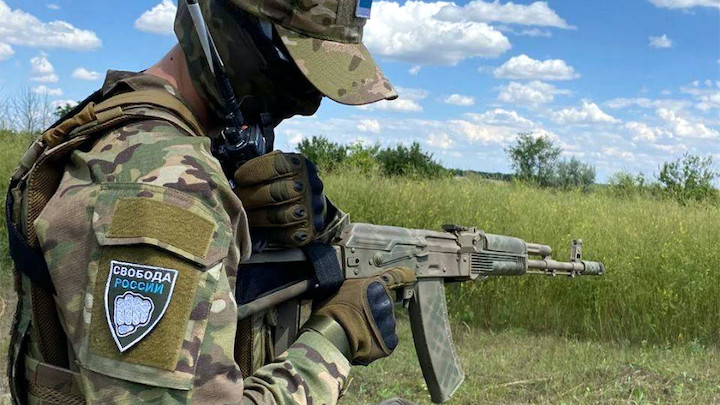

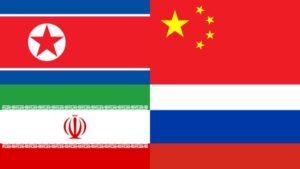
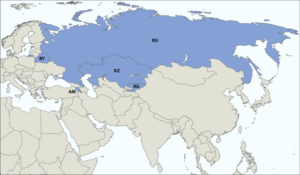




日軍第731部隊旧址_PB121201-e1713902593308-300x224.jpg)





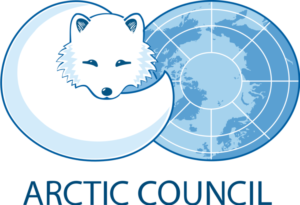

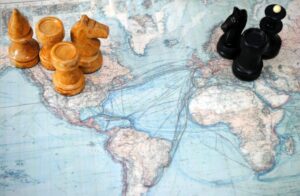


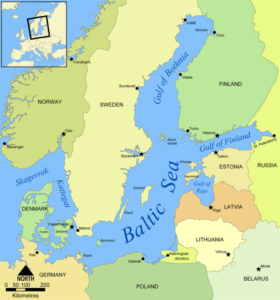




[…] economy already affected by energy prices, due to the war between Russia and Ukraine, is hitting domestic finances and the public’s fear is growing about the health of the […]
[…] industry could make the Union a world arms industry champion. As we have already written about the weakening of Russia’s defense industry due to the war in Ukraine, having a strong defense industry guarantees partnerships and alliances around the world since the […]
[…] said, it is clear that the shock caused by the war goes far beyond Russia and Ukraine, as geopolitical risks have increased globally. So, with disruptions in supply chains, rising […]
[…] of crises more autonomously from the United States.Therefore, the Strategic Compass recognizes Russia as a threat to the security of the continent. As such, the policy emphasizes the importance of preserving […]
[…] Under analysis, China’s imperialist and expansionist attitude towards Taiwan could threaten the country’s economy, as well as Russia’s. […]